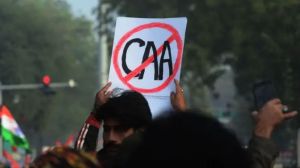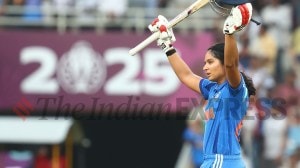Look who’s a pseudo-secularist
The man who popularised the phrase ‘‘pseudo secularist’’ may have fallen into the very trap he cautioned others to bewar...

The man who popularised the phrase ‘‘pseudo secularist’’ may have fallen into the very trap he cautioned others to beware of. When he spearheaded the Ram Janmabhoomi movement, L.K. Advani argued eloquently that tokenism and minority appeasement should not be interpreted as genuine secularism, which simply implies that people must be treated with equal respect regardless of their religion. Pandering to religious orthodoxy, such as passing a new Act for Muslim women concerning their maintenance rights in the wake of the Shah Bano judgment, or the recent decision to introduce a Muslim quota at the tax payer-funded Aligarh Muslim University are actually communal not secular acts.
So what exactly was the BJP president trying to prove when he raked up a 50-year old speech by Jinnah to establish his secular credentials? Why quote Sarojini Naidu’s remark that Jinnah was ‘‘an ambassador of Hindu Muslim unity’’ in the visitor’s book at Jinnah’s mausoleum. Surely Advani, or his speech writer, was aware that the poet’s praise of Jinnah was in the early part of the twentieth century, more than two decades before Jinnah swore ‘‘I will see India divided or India destroyed.’’ Jinnah, who in August 1946 gave the call for ‘‘Direct Action Day’’ which triggered a blood bath, was certainly not secular. Nor was he communal. He was simply pseudo-communal. The westernised Jinnah, who aped the British in his life style and ignored Islamic teaching regarding liquor, food and social norms, whipped up religious fervour when he sniffed an opportunity to exploit the communal divide to further his personal political ambitions.
In his speech to the Pakistan Constituent Assembly in 1947, which so impressed Advani, Jinnah assured his countrymen that every Pakistani citizen no matter what creed, colour or religion, would have equal rights and privileges. But his wishes were certainly not honoured in the country he founded. Visitors to Pakistan are struck by the fact that Hindus have practically disappeared in what was once West Pakistan, though they formed 23 per cent of the population at the time of Independence. By 1991, Hindus were down to three per cent according to the official census. In my short stay in Karachi more than a decade ago, I saw less than a handful of Hindus. One was a sweet shop owner who kept looking furtively over his shoulder, afraid to be seen talking to Indians. Another was a Sindhi landlord whose family was migrating piecemeal to India in the hope that it could retain its property in Pakistan. The third lot of Hindus were menial workers. Prior to Partition, Hindus constituted over 40 per cent of the cosmopolitan population of Karachi.
Today, minorities, apart from a token Christian or Parsi, do not figure in Pakistan’s power elite, whether in the army, parliament, media or the bureaucracy. Minorities do not even have the same voting rights as Muslims. Hindus have a separate electorate and can vote only for Hindu representatives.
NDA allies and a section of the media which hailed Advani’s ill-chosen words in Pakistan have fallen into the same pseudo-secular trap. They have interpreted Advani’s actions as a bid to free the BJP from the RSS’s narrow and bigoted agenda and have praised him for his courage. Not surprisingly, the BJP’s allies in the NDA who are anxious to regain their minority voters are today Advani’s most ardent supporters, rather than his own party colleagues. But few stop to question the logic that praise of a Pakistani hero should be construed as an act of secularism. It is surely insulting to Indian Muslims to assume that they will be pleased if one extols the founder of Pakistan.
Quoting a speech of Jinnah out of context is a senseless gesture similar to our Leftist historians re-writing history to ensure that Aurangzeb is not portrayed as a fanatic or giving lengthy explanations as to why the jaziya tax was not really anti-Hindu. Such tokenism, distorting truth to please a section of the minorities, is of a piece with the mindset of opportunist Hindu politicians who don Muslim prayer caps, host Iftaar parties and inaugurate Urdu classes simply to demonstrate their secular credentials. If Advani wanted a genuine makeover of his image and to rectify the portrayal of the BJP as communal he had simply to express regret unequivocally for the Narendra Modi government’s role in the Gujarat riots.
In fact, Advani’s motivation for raising an intellectual debate about Jinnah’s role in history remains a mystery. Was it an extravagant gesture of politeness to his hosts, to demonstrate to the Pakistanis that he did not have horns? Was it a gentle nudge to the Pakistanis that they were not following the principles preached by the founder of Pakistan? (If this was the case then the message was so subtle it was lost on practically everyone.) Did he want to make himself more acceptable as a leader to the BJP’s allies or to show the VHP and RSS their place? While Advani’s intentions were no doubt honourable, the rush of sentiment on returning to his birthplace seems to have clouded his judgement. Even his acceptance of the invitation to the Katas Raj temples seems ill-advised. Surely it should have struck him that it provided enormous propaganda potential to the host country. The man accused of demolition of the Babri Masjid in India was being allowed to inaugurate the restoration of an ancient temple by the Pakistanis. The fact that there is in general a low level of tolerance for mandirs in theocratic Pakistan is another matter.
For years the assumption was that Advani was the Sangh Parivar favourite. The man who took a hardline on Ram Janmabhoomi, terrorism and Pakistan. He was projected as firm, decisive and committed to his ideology. Advani’s tall lean and trim frame perfectly fitted the Just as the round and jovial Vajpayee is seen as the genial father figure, charismatic but a bit of a waffler. After his Pakistan trip, the image of the Iron Man will never be quite the same again. Nasty-minded critics suggest that a high content of aluminum has crept into the metal.



- 011 day ago
- 0221 hours ago
- 031 day ago
- 041 day ago
- 0521 hours ago




























